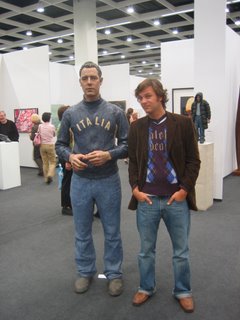Is Google a technology company or a media company?
Is Google a technology company or a media company? We're absolutely deep in advertising, but let me clarify. The difference between us and our competition is that we innovate through applying technology. The angle of a media company is you're packaging content or advertising inventory. We look at ads as commercial information, and that goes back to our core mission of organizing the world's information. When people in the media world hear this, they say, "What are these guys talking about?" Google has introduced a lot of products lately, but the engine of your revenue and profit is clearly your text-based AdWords. How did they start?
When I joined Google in 1999, we still hadn't suffered the dotcom collapse, and a lot of money was still being spent on classic portal sponsorship deals, the kind I did at Netscape -- multimillion-dollar deals. And at Google, I called those same clients and asked them to do a $1,000 or $5,000 AdWords test with me.
Once we proved that the text ads on Google could be successful and not interfere with the search experience, then it really turned into a science. We applied auction theory to maximize value -- it was the best way to reach the right pricing, both for advertisers and for Google. And then we innovated by introducing the rate at which users actually click on the ads as a factor in placement on the page, and that was very, very useful in relevance. Sergey Brin once told me that if AdWords didn't work, he figured that Google could always run to DoubleClick as a life preserver. How close did you get to doing that deal?
Initially we debated whether to build our own ad product. Larry and Sergey believed we could develop a better product than the existing online advertising offerings, but we knew that they could be a fallback if Google's ad program did not work.
Right after the collapse, people were cynical about online advertising. But we monitored our traffic and the click-through rate of the ads. It quickly became apparent that AdWords was working. The model was perfect because people were willing to try something out for $1,000 and see if they could get enough leads to justify additional spending. And as we gradually built a customer base, it had this nice trend line, up and to the right.
Did you ever realize how big this was going to get? I didn't. This is a difference between Larry and me. Larry said, "Are you crazy? I always thought it was going to be this big." What was amazing about these founders was that during the hardest times, they had confidence that we could get through things. I'm very optimistic, but I've been through two unsuccessful startups, and I was at Netscape, where we had incredible challenges after competition heated up. So I wanted to be more paranoid about things.
Do you feel the pressure of being a public company now? I certainly do, yeah. This level of growth is just unprecedented. But our business is different from traditional businesses. I've been in the enterprise software business, where the customer is trained to maximize discounts by waiting until the last day of the quarter to buy. You end up having the sales force trying to save the quarter on the last day.
The beauty of our business is we can't do that. The way the auctions and the pricing models are working together involves lots of math -- that's the beauty of it. When it's more predictable, when it's more math-based, then in some ways you have more control. It's not about doing a diving catch at the end of the quarter to make your numbers, but making sure all the dials on the dashboard are where you expect them to be.
What do you see as the future of advertising? The measurability of online advertising will extend broadly to all areas of media. You have companies spending billions of dollars on television. As more and more consumers adopt technologies like TiVo, I think you'll be able to have much more useful forms of advertising -- more targeted, more measurable, and with new pricing models. Just imagine if we made it possible for our advertisers to quickly publish relevant ads that could range from the local plumber on one end to Super Bowl commercials on the other.
You're now selling ads for a vast network of third-party websites. Is Google turning into an ad agency? No. As a matter of practice, Google will work with advertisers in any way they want to work with us, whether directly, through a traditional agency, or through a specialty search-engine marketing firm. Google sees agencies as crucial. Agencies create and execute marketing strategies for their customers, and Google helps them execute those objectives.
You've taken some knocks from advertisers who feel frustrated because, they say, they can't get anybody at Google on the phone. What are you doing about that perception? People call us a black box because we make things too simple. I have a huge organization focused on this. And I apologize if people are not having the best experience. I take that seriously.
I've heard horror stories about click fraud. What's your take? We watch it very carefully. Whenever we find it, we are very good at refunding the advertisers. We've got some of our best researchers working on this. It becomes a little bit of a cat-and-mouse game where people become more sophisticated and try to beat the system, but ultimately we find it.
Google is the big target now. Microsoft is clearly gunning for you. Any feeling of déjà vu from your days at Netscape?
Netscape ran into a bad mix of competition and "gold rush" mentality in short order. Google, being a generation later, was able to learn from what Netscape did well and build on it. The best déjà vu is working with the distinguished Netscape alumni at Google.
Find this article at http://www.business2.com/b2/subscribers/articles/0,17863,1104033,00.html
©2005 Business 2.0 Media Inc. All rights reserved. Reproduction in whole or in part without permission is prohibited.







